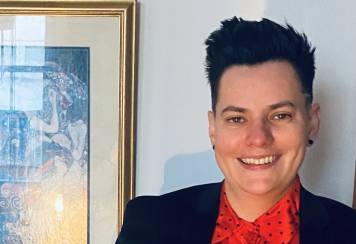Boardroom Premium


Organisational structures are essential for productivity, but could yours be limiting growth for future leaders and diverse stakeholders?
“Diversity is being invited to the party; inclusion is being asked to dance.” These powerful words from US diversity consultant, author and lawyer Verna Myers resonate with anyone who has experienced being an outsider.
Marginalised groups instinctively know when they’ve been genuinely brought into the conversation. There’s a sense of ease and an ability to breathe without needing to perform. But creating a workplace where all voices are heard requires changes to organisational structures that enable inclusion.
For the Rainbow community, the shifting geopolitical landscape continues to negatively impact visible progress. Where companies once proudly highlighted DEI (diversity, equity and inclusion) efforts on social media, many now operate with caution, stepping back from openly expressing their stance.
Auckland-based Stuart Knight MInstD is the former CEO of Australian biotech company Roche and a 2024 mentee in the IoD’s Mentoring for Diversity programme. He says while there is a ‘softening’ due to the sensitive nature of the current political environment, that doesn’t mean work isn’t happening in the background. Instead, organisations are shifting to ‘passive programmes’ that provide wider access to resources supporting marginalised communities.

Stuart Knight
During his tenure with Roche, Knight saw the direct benefits of implementing such programmes, such as employee-driven special interest groups that help build support networks and create safe spaces. The company also embedded inclusive policies to share best practice and foster inclusion.
“One example was a leave policy designed to support trans employees undergoing affirming surgery, even if no one immediately needed it,” says Knight. “It helped establish an environment of respect and care.”
Knight, a pharmacist by trade, spent much of his professional career overseas, including previous board roles with Medicines Australia, Swisscham Hungary (Swiss Hungarian Chamber of Commerce), Medicines New Zealand, and Budapest-based pharmaceutical industry group, Innovatív Gyógyszergyártók Egyesülete (AIPM).
Building an inclusive culture has been important in his leadership roles, and that’s partly because of his experience as an outsider. Coming out as a gay man in the 1980s and 90s posed significant career risk, particularly under the ‘command and control’ leadership style of the time, which Knight says left no room for authenticity in a professional environment.
In contrast, modern leadership is about psychological safety and openness – where leaders talk candidly about family, mental health and lived experiences.
Knight believes leaders who show vulnerability and admit to ‘off days’ build greater trust and impact.
“I was only able to achieve the things I did because I was able to be myself. It was a huge benefit as a result . . . visibility is extraordinarily important and we need to have Rainbow directors to show that it’s not a big deal,” he says.
Greater representation of marginalised groups helps normalise diversity at leadership levels. This creates growth opportunities – for individuals and organisations.
But to build safe organisational structures where diversity can thrive, the change needs to be top-down, according to Jessie Lewthwaite, Co-Chair of the Rainbow New Zealand Charitable Trust.
“It needs to come from the people who have the power, the resources, time, effort and energy to be able to be like, ‘this is non-negotiable. This is not something that is a nice to have’,” she says.

Jessie Lewthwaite
The Rainbow New Zealand Charitable Trust (RNZCT), now in its 26th year, supports events such as PRIDE, grassroots fundraising and rainbow scholarships. It also provides development opportunities that aim to empower the community.
For boards wanting to attract top talent, Lewthwaite believes having the right organisational structures in place ensures people can thrive. She recommends hiring a D&I professional to support the necessary changes.
“The workplaces that are really good at this will have a D&I team and subject matter experts that work exclusively for one marginalised group within that organisation, so that’s best practice,” she says.
In addition to her co-chair role, Lewthwaite is the National Rainbow Lead for Te Whatu Ora, a consultant, and queer subject matter expert. She says a board strategy that can create meaningful change is as simple as paying people what they’re worth, which avoids tokenism and introduces accountability. “You need to put your money where your mouth is.”
“If you’re putting all of this additional workload on your queer workers and none of it is in their job descriptions and they're not getting any financial recognition for that additional contribution, you're using your workers to make yourself look better, not make the workplace better,” she says.
Organisations can also become allies and attract top talent by showing they’re embedded in the community, which is advantageous for everyone.
“You can help improve the community by doing things such as funding scholarships, supporting charitable organisations to continue to function, attending your regional Pride event . . . [just like] your people who show up for work every day who are part of the [rainbow] community, they don’t just exist the moment they sit at their desk.”
From a stakeholder perspective, this also adds value. Lewthwaite says authentic strategies also help new graduates identify their ‘top picks’ for the companies they want to work for “where they feel accepted for who they are.”
Mentoring is another valuable way to grow the next generation of queer leaders, but Lewthwaite is emphatic about the past and present obstacles. She says the older generation of leaders were often looking to mentor “the next version of themselves”, which produces the same vision of leadership.
For rainbow leaders like Knight (and those who have gone before him), an era of heightened self-suppression has affected the current landscape, where there are fewer mentoring opportunities – and fewer shoes to step into.
The next generation also battles with ‘public perception’ because of organisational structures that have created different obstacles.
“Now, we’re seeing barriers where you’re known in your workplace as being ‘the gay one or the queer one or the trans one’ – and tokenism can come with that identity,” Lewthwaite says.
The other, much wider issue affects the community at a deeper level. Those who identify as LGBTQIA+ are three times more likely to experience anxiety and depression than those who don’t. The demonisation of the rainbow community in the media also means that “people are often vilified”.
“Just like anybody else, they are trying to provide for themselves and their families,” says Lewthwaite, adding that ‘gender presentation’ can also create a barrier for communication and how you’re perceived in a professional setting. This is something Lewthwaite experienced first-hand.
“People sometimes assume I would prefer he/him pronouns, or they don’t know how to have a comfortable and confident interaction with me as opposed to asking, so they avoid having an interaction altogether,” she says.
But one thing she wants to make clear: diversity exists within the rainbow community as it does within all communities, “We’re not a monolith – there are a thousand ways to be Rainbow, but we all identify as being under that umbrella,” Lewthwaite says.